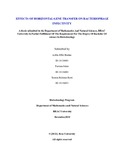Effects Of horizontal gene transfer on bacteriophage infectivity
Abstract
Vibrio cholerae is one of the very well-known and common pathogenic bacteria which cause
mild to severe gastrointestinal diseases, and in extreme cases, patients die. Specially children are
victims where proper clinical,environmental, and public health support are insufficient. As a
treatment, antibiotics were promising until vibrio cholerae became multidrug resistant by raising
a global concern. In our environment many antibiotic resistant genes are increasing day by day.
Following previous successful studies, bacteriophage therapy for antibiotic resistant vibrio
strains is considered as one of the potential solutions to such problems. In this study, six native
strains of vibrio cholerae from the environment underwent antibiotic resistant transformation.
The main purpose of this study is to observe the infectivity of selected bacteriophages on strains
of similar genetic makeup following antibiotic resistant traits, especially ampicillin and
kanamycin antibiotics. In other words, to find the potentiality of phage therapy. A positive
finding will be beneficial for vibrio cholera treatment and contribute to clinical, environmental
biotechnology and public health as well. Therefore, by isolating antibiotic resistant genes
containing DNA, transforming those into native vibrio strains and finally double layer spot test
on the prepared strains gave a conclusive and intriguing outcome of phage infectivity which
favors future studies with more antibiotic resistant vibrio strains and bacteriophages.

